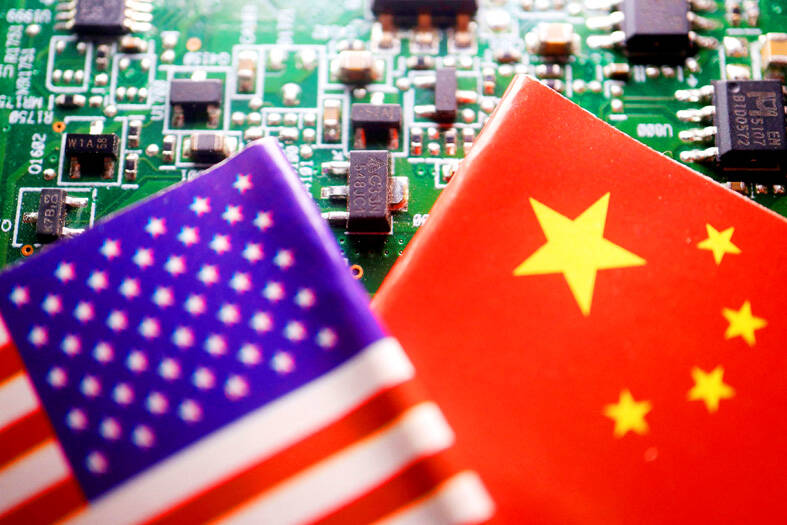US President Joe Biden’s administration could unveil new export restrictions on China as soon as this week, the US Chamber of Commerce told members in an e-mail on Thursday last week.
The new regulations could add up to 200 Chinese chip companies to a trade restriction list that bars most US suppliers from shipping goods to the targeted firms, the e-mail from the powerful Washington-based lobbying group said, according to an excerpt seen by Reuters on Friday.
The US Department of Commerce, which oversees US export policy, plans to publish the new regulations “prior to the Thanksgiving break” on Thursday, according to the e-mail.

Photo: REUTERS
The US Chamber of Commerce did not respond to a request for comment.
The commerce department declined to comment.
The update, if accurate, shows the Biden administration is plowing ahead with plans to further crack down on China’s access to semiconductors even as the start of US president-elect Donald Trump’s second term in January approaches.
Another set of rules curbing shipments of high-bandwidth memory chips to China is expected to be unveiled next month as part of a broader artificial intelligence package, the e-mail said.
Biden has slapped a raft of export controls on China aimed at halting its technological advances, amid fears the technology could be used to bolster China’s military.
Sources briefed on the matter said the first round of regulations would likely include restrictions on chipmaking tool shipments to China.

Vincent Wei led fellow Singaporean farmers around an empty Malaysian plot, laying out plans for a greenhouse and rows of leafy vegetables. What he pitched was not just space for crops, but a lifeline for growers struggling to make ends meet in a city-state with high prices and little vacant land. The future agriculture hub is part of a joint special economic zone launched last year by the two neighbors, expected to cost US$123 million and produce 10,000 tonnes of fresh produce annually. It is attracting Singaporean farmers with promises of cheaper land, labor and energy just over the border.

US actor Matthew McConaughey has filed recordings of his image and voice with US patent authorities to protect them from unauthorized usage by artificial intelligence (AI) platforms, a representative said earlier this week. Several video clips and audio recordings were registered by the commercial arm of the Just Keep Livin’ Foundation, a non-profit created by the Oscar-winning actor and his wife, Camila, according to the US Patent and Trademark Office database. Many artists are increasingly concerned about the uncontrolled use of their image via generative AI since the rollout of ChatGPT and other AI-powered tools. Several US states have adopted

A proposed billionaires’ tax in California has ignited a political uproar in Silicon Valley, with tech titans threatening to leave the state while California Governor Gavin Newsom of the Democratic Party maneuvers to defeat a levy that he fears would lead to an exodus of wealth. A technology mecca, California has more billionaires than any other US state — a few hundred, by some estimates. About half its personal income tax revenue, a financial backbone in the nearly US$350 billion budget, comes from the top 1 percent of earners. A large healthcare union is attempting to place a proposal before

KEEPING UP: The acquisition of a cleanroom in Taiwan would enable Micron to increase production in a market where demand continues to outpace supply, a Micron official said Micron Technology Inc has signed a letter of intent to buy a fabrication site in Taiwan from Powerchip Semiconductor Manufacturing Corp (力積電) for US$1.8 billion to expand its production of memory chips. Micron would take control of the P5 site in Miaoli County’s Tongluo Township (銅鑼) and plans to ramp up DRAM production in phases after the transaction closes in the second quarter, the company said in a statement on Saturday. The acquisition includes an existing 12 inch fab cleanroom of 27,871m2 and would further position Micron to address growing global demand for memory solutions, the company said. Micron expects the transaction to